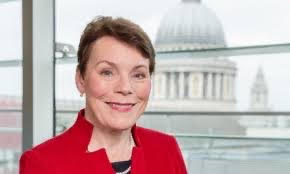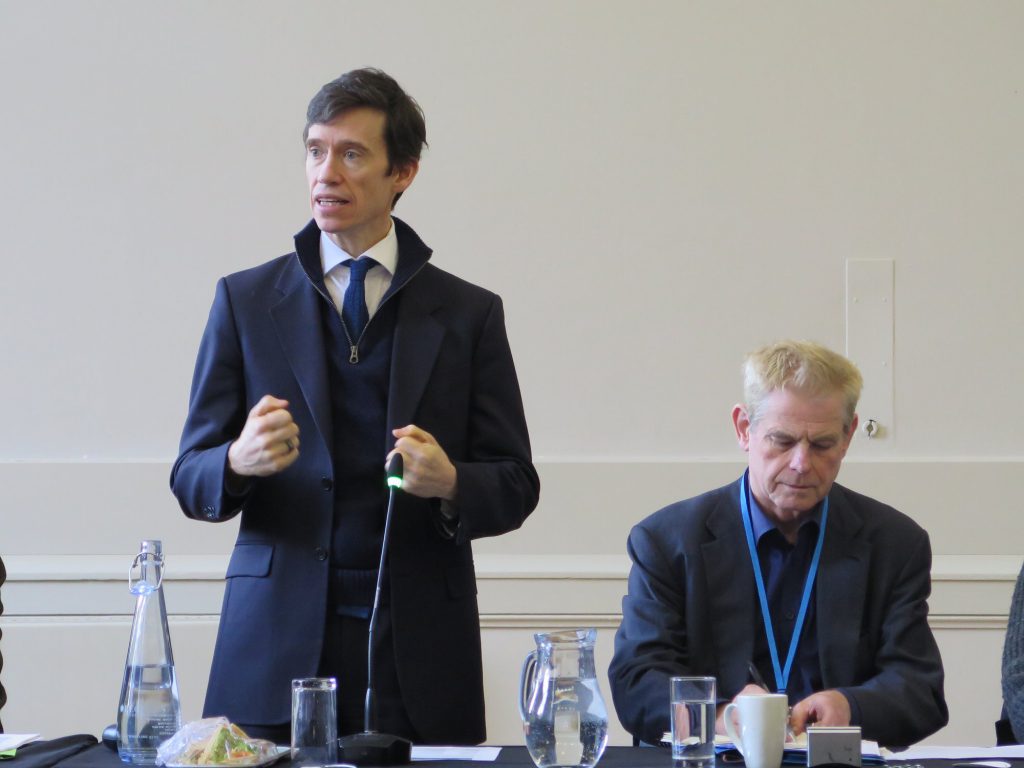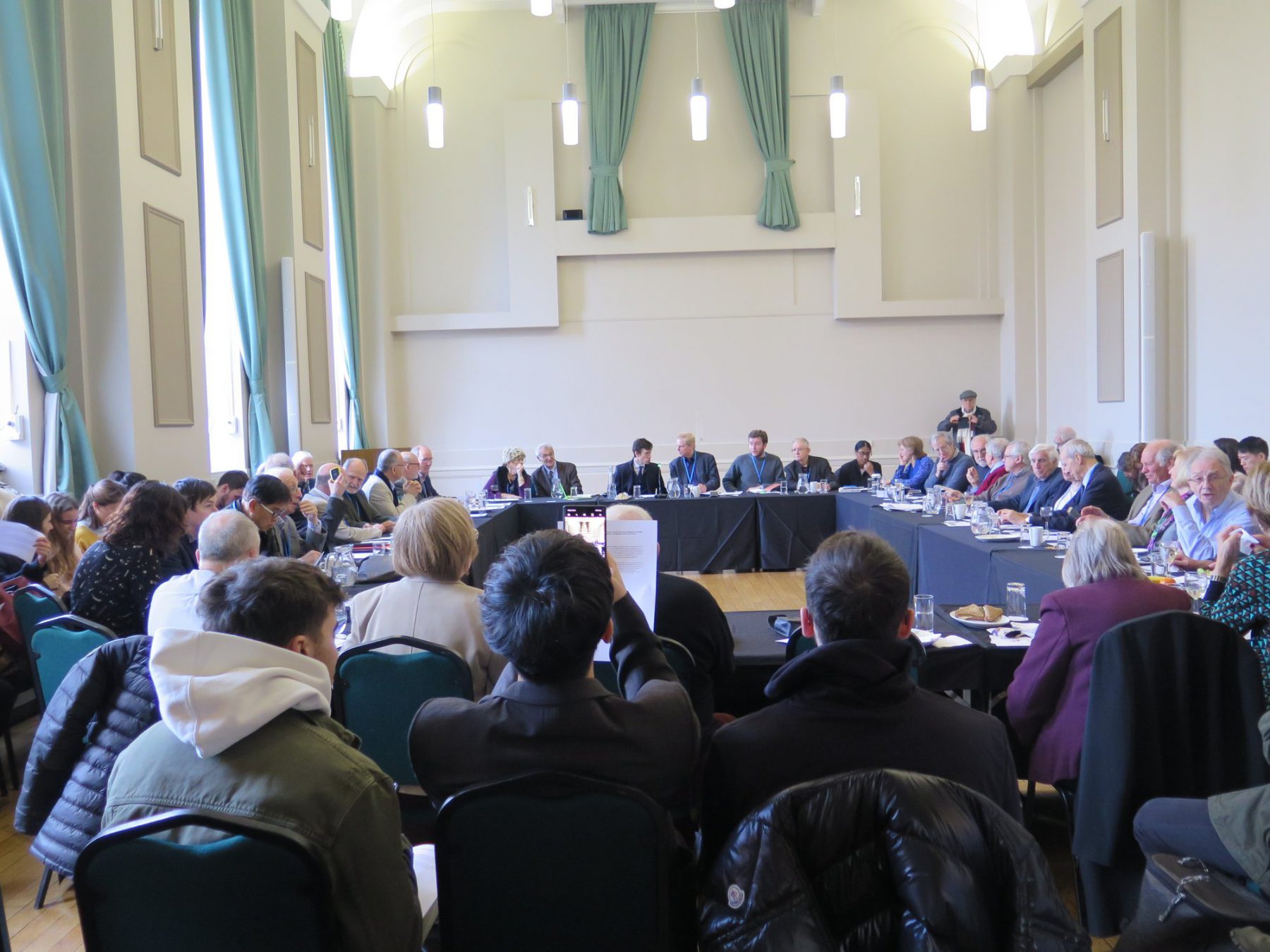The AEJ UK continued to hold meetings through the 2020 year of covid, switching to virtual online meetings after the March lockdown.
4 December 2020
Catherine McGuinness – Confident of future after Brexit

Catherine McGuinness, chair of the influential policy and resources committee of the City of London Corporation, said the City will remain a great centre for global capital after Brexit – deal or no deal.
She spoke at a meeting with AEJ UK members, London’s Foreign Press Association and other specially invited journalists, on December 4 at a delicate moment in UK-EU relations, just days away from a final deadline in talks about a possible trade deal.
While the City did want a UK-EU post Brexit deal, she said the financial sector was already taking steps to ensure and strengthen relations with the EU even as it accepted the nature of London’s relationship would change.
McGuiness is also deputy chair of City UK, the lobby group for UK-wide financial services.
For more on the meeting please see this report by Peter Norman, AEJ meetings secretary and former economics editor of the Financial Times, and this audio record of the meeting.
2 November 2020
Can Yeginsu – Media freedom and the rule of law
Media freedom and the rule of law are inextricably linked and both are necessary to enable people to assert their rights and hold the powerful to account, says a leading UK human rights lawyer.
Can Yeginsu, one of 15 leading international lawyers appointed last year to the High Level Panel of Legal Experts on Media Freedom in a much-publicised bid by the governments of the UK and Canada to counter what they termed a “global assault on media freedom”, spoke to a meeting of AEJ members and other international journalists on November 2.
The panel was set up as part of an international campaign to turn back the worsening trend of attacks on press freedom worldwide and its core goal is to bring about a better level of compliance by state authorities with the framework of international legal protections for journalists that is recognised by most governments in theory but often disregarded in practice.
For more on his presentation please see this report from AEJ UK chairman William Horsley and this audio recording of the meeting. And please see here for more information on the work of the High Level Legal Panel
3 September 2020
Sir Robert Watson – Governments fail on climate crisis …
says eminent UK climate scientist, Prof. Sir Robert Watson.
Joining the AEJ UK via Zoom from Washington on September 3, Professor Watson talked frankly and passionately about the “crisis” of human-induced climate change – he said governments are not reacting;
young people are rightly concerned;
greenhouse gases are increasing despite the Paris Agreement;
all the hottest years on record have been in this century.
And this means the threats to human life include drier weather in arid areas threatening water and food security, more floods in wet regions and rising sea levels threatening coastal communities.
Sir Robert was chair of the UN Intergovernmental Panel on Climate Change (1997 – 2002), is emeritus professor at the Tyndall Centre for climate research at the University of East Anglia, and is currently leading a major international assessment of the links between Climate Change, Biodiversity Loss, Land Degradation and Food and Water Security, and how they will affect human well being.
Please see this full report from AEJ member and former BBC editor and manager Rick Thompson – and this audio record of the meeting.
3 July 2020
Danita Huebner – A view from Europe
The AEJ UK held its second virtual meeting of the coronavirus lockdown on July 3 with Danuta Huebner MEP, a member of Poland’s centre-right Civic Platform and the European People’s Party in the European Parliament, who served previously as an EU Commissioner and Polish Minister for Europe.
Professor Huebner drew on her experiences of high-level involvement with Polish and European politics over the past two decades to answer a host of topical questions – the uncertain outlook for democracy and the rule of law in her native Poland, the impact of the Covid-19 pandemic on Europe, likely EU-UK relations post-Brexit, and the EU’s relationship with China at a time of unstable leadership in the US.
Please see this report from former FT correspondent Peter Norman on the wide-ranging discussion with 28 UK and Irish AEJ members who joined the call.
4 June 2020
Llewellyn King – America in trouble
Veteran American journalist and columnist Llewellyn King was the online guest from Washington for the AEJ-UK’s first Zoom meeting on June 4.
The wave of angry protests and riots that erupted across America following the police killing of George Floyd in Minneapolis are a “bellow of rage” against the Trump administration, he said, and the U.S. “has never been on such a precipitous slope since the Civil War.”
The honorary AEJ member and host and producer of the weekly PBS program “White House Chronicle” was joined by 20 AEJ online participants.
For more on his analysis please read Peter Norman’s account of the AEJ’s “Letter from America with Llewellyn King” event and on King’s own website.
9 March 2020
Jeff Kingston – China and Asia
China will bounce back from the coronavirus disruption, probably without any major long-term geopolitical impact. But, says Asia and China scholar Jeff Kingston, the consequences for President Xi Jinping might be less clear. Kingston – writer, columnist and Director of Asian Studies at Temple University Tokyo – briefed an AEJ UK meeting on March 9 2020 on China’s relationships in Asia.
Please see this report on the meeting from former FT correspondent Peter Norman and this audio recording.
20 February 2020
Nicola Hudson – UK cyber security
How is the UK dealing with threats to cyber security and defending against them?
As Brexit looms and debate continues about potential cyber threats such as the involvement of China’s Huawei in 5G telecommunications and Russian or other state interference in democratic processes in the UK and elsewhere, Nicola Hudson, Director of Policy and Communications at the National Cyber Security Centre (NCSC), explained the role of her young agency.
She told the AEJ on February 20 2020 the NCSC, formed only 3 years ago, functions in two very different worlds:
– as an operational division of GCHQ, the UK’s signals intelligence agency, involved for instance in the government’s recent controversial decision to allow Huawei access in the development of 5G mobile telecommunications in Britain
– and at a public level seeking ways of raising awareness of fast growing cyber threats and devising innovative ways of developing the population’s cyber security skills for a future where artificial intelligence, computer power and online activity will be ever more central.
For more on her presentation please see this report from former FT correspondent Peter Norman and this audio recording.
29 January 2020
Rory Stewart – London central to UK future relations with EU?

Rory Stewart, former Conservative MP, cabinet minister, and former contender for Conservative party leader, says London could have a “very, very central” part to play in Britain’s future relations with the European Union.
Stewart was an independent candidate for London mayor in elections scheduled for May 7 2020 but withdrew after they were postponed for a year.
He told an AEJ UK meeting on January 29 2020 that London’s connections and contributions are crucial to the success of the rest of the UK and it could act as a bridge between Britain and the EU over the next 10 to 15 years in areas such as artificial intelligence, robotics and nanotechnology while still learning from policies in other European cities.
For more on his argument and following discussion please see this report from former FT correspondent Peter Norman and this audio recording of the meeting.








